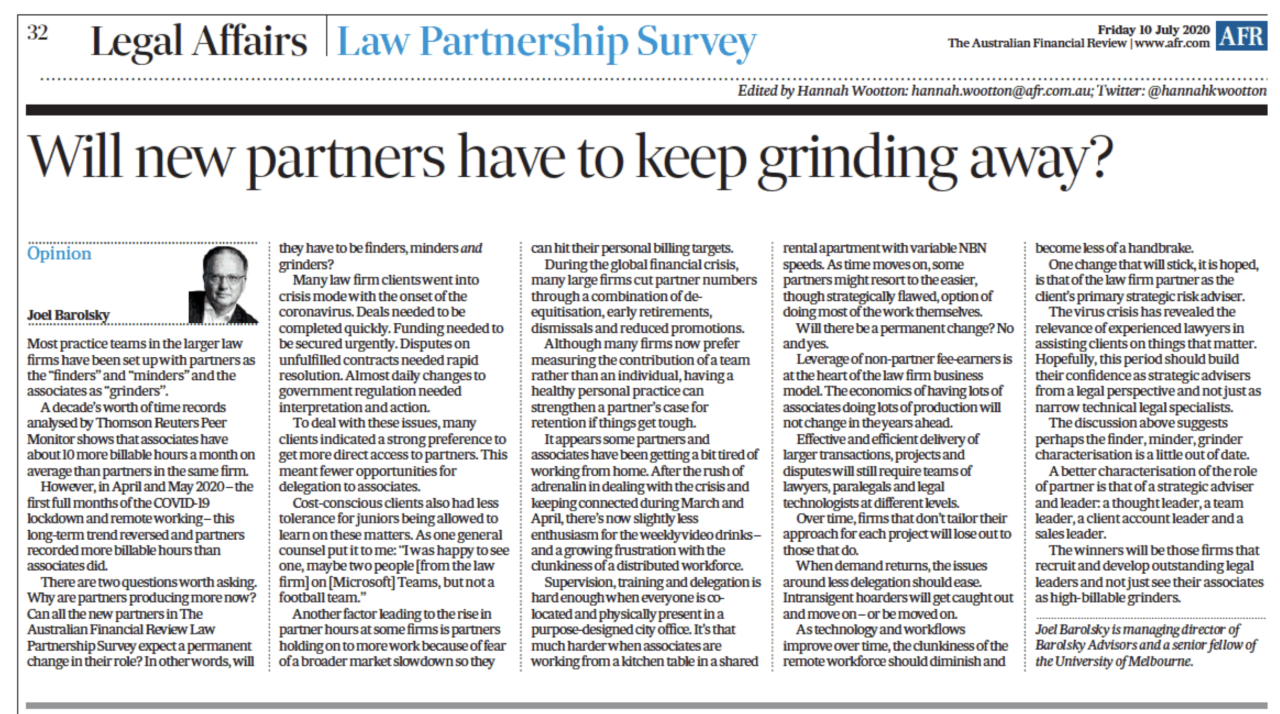
Will new partners have to keep grinding away?
Full text of my opinion piece first published in the Australian Financial Review on 9 July 2020.
Most practice teams in the larger law firms have been set up with partners as the "finders" and "minders" and associates as "grinders".
A decade’s worth of time records analysed by Thomson Reuters Peer Monitor shows that associates have around 10 more billable hours per month on average than partners in the same firm.
However, in April and May 2020 - the first full months of the COVID-19 lockdown and remote working - this long-term trend reversed and partners recorded more billable hours than associates.
There are two questions worth asking. Why are partners producing more now? Can all the new partners in the Financial Review Law Partnership Survey expect a permanent change in their role? In other words, will they have to be finders, minders and grinders?
Why now?
Many law firm clients went into crisis mode with the onset of the coronavirus. Deals needed to be completed quickly. Funding needed to be secured urgently. Disputes on unfulfilled contracts needed rapid resolution. Almost daily changes to government regulation needed interpretation and action.
To deal with these pressing and complex issues many clients indicated a strong preference to get more direct access to partners. This meant fewer opportunities for delegation to associates.
Cost-conscious clients also had less tolerance for juniors being allowed to learn on these matters. As one general counsel put it to me: “I was happy to see one maybe two people [from the law firm] on [Microsoft] Teams, but not a football team.”
Another factor that has led to the increase in partner hours at some firms is partners holding on to more work due to fear of a broader market slowdown so they can hit their personal billing targets.
During the GFC, many large firms cut partner numbers through a combination of de-equitisation, early retirements, dismissals and reduced promotions.
While many firms now prefer measuring the contribution of a team rather than an individual, having a healthy personal practice can strengthen a partner's case for retention if things get tough. In recent weeks, it appears that some partners and associates have been getting a little tired of working from home.
After the rush of adrenalin in dealing with the crisis and keeping connected during March and April, there’s now slightly less enthusiasm for the weekly video drinks - and growing frustration with the clunkiness of a distributed workforce.
Supervision, training and delegation is hard enough when everyone is co-located and physically present in a purpose-designed city office. It’s that much harder when associates are working from a kitchen table in a shared rental apartment with variable NBN speeds.
As time moves on, some partners might resort to the easier - though strategically flawed - option of doing most of the work themselves.
Will there be a permanent change?
No, and yes.
Leverage of non-partner fee-earners is at the heart of the law firm business model. The economics of having lots of associates doing lots of production will not change in the years ahead. Effective and efficient delivery of larger transactions, projects and disputes will still require teams of lawyers, paralegals and legal technologists at different levels.
Over time, firms that don’t tailor their approach for each project will lose out to those that do.
When demand returns, the issues around less delegation should ease. Intransigent hoarders will get caught out and move on - or be moved on.
As technology and workflows improve over time, the clunkiness of the remote workforce should diminish and become less of a handbrake.
One change that will hopefully stick is that of the law firm partner as the client’s primary strategic risk advisor. The coronavirus crisis has revealed the relevance of experienced lawyers in assisting clients on things that matter. This period should hopefully build their confidence as strategic advisors from a legal perspective and not just narrow technical legal specialists.
The discussion above suggests that perhaps the finder minder grinder characterisation is a little out of date.
A better description of the role of partner is that of a strategic advisor and leader – a thought leader, a team leader, a client account leader, a project leader and a sales leader.
The winners will be those firms that recruit and develop outstanding legal leaders and not just see their associates as high-billable grinders.
Commercial Real Estate | Affordable Housing Projects | NFP Property Lawyer | Commercial Leasing Specialist
3yAppreciate your article Joel. Although at Moores we're not wedded to the leverage model, your insight into the need for partners to bring multi-faceted leadership skills to the table rings true. Each element is needed at different times.
Family Law Specialist | Mediator | Arbitrator | Collaborative Lawyer
3yThanks for this piece Joel. Always good to see someone shaking the tree, and giving some positive insights. i echo Henry Kalus' comments as well about people stepping into necessary positions of thinking and doing.
🌏 Planet Enabler & Sustainable Speaker and Business Mentor 🌏
3yA great read Joel!
Executive Coach, Meditation Teacher, Facilitator, Director
3yPerhaps the best response is fitness for purpose: sometimes it will be the partner who is best placed to respond, sometimes a key senior associate or a larger more diverse team on a complex matter. Then again it could just be partners enjoying getting back on the tools with more time on their hands!
Legal Practitioner Director at SJR Commercial Law
3yExcellent article thanks Joel - lots of truth in it